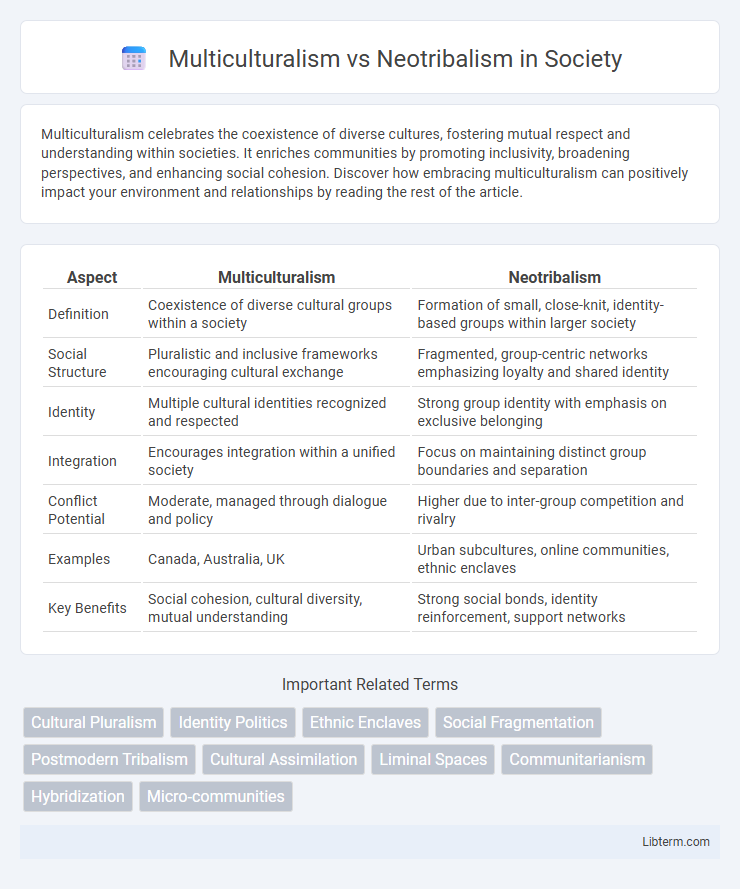Multiculturalism celebrates the coexistence of diverse cultures, fostering mutual respect and understanding within societies. It enriches communities by promoting inclusivity, broadening perspectives, and enhancing social cohesion. Discover how embracing multiculturalism can positively impact your environment and relationships by reading the rest of the article.
Table of Comparison
| Aspect | Multiculturalism | Neotribalism |
|---|---|---|
| Definition | Coexistence of diverse cultural groups within a society | Formation of small, close-knit, identity-based groups within larger society |
| Social Structure | Pluralistic and inclusive frameworks encouraging cultural exchange | Fragmented, group-centric networks emphasizing loyalty and shared identity |
| Identity | Multiple cultural identities recognized and respected | Strong group identity with emphasis on exclusive belonging |
| Integration | Encourages integration within a unified society | Focus on maintaining distinct group boundaries and separation |
| Conflict Potential | Moderate, managed through dialogue and policy | Higher due to inter-group competition and rivalry |
| Examples | Canada, Australia, UK | Urban subcultures, online communities, ethnic enclaves |
| Key Benefits | Social cohesion, cultural diversity, mutual understanding | Strong social bonds, identity reinforcement, support networks |
Introduction: Defining Multiculturalism and Neotribalism
Multiculturalism promotes the coexistence of diverse cultural identities within a unified society, emphasizing inclusion and equal respect for all ethnic, religious, and social groups. Neotribalism, by contrast, refers to the resurgence of small, close-knit communities or tribes that prioritize shared identity, values, and traditions, often reacting against larger societal multicultural frameworks. Understanding these concepts highlights the tension between broad cultural integration and localized group allegiance in contemporary social dynamics.
Historical Roots and Evolution
Multiculturalism emerged post-World War II as a framework promoting the coexistence of diverse cultural identities within nation-states, rooted in civil rights movements and decolonization efforts. Neotribalism, drawing from anthropological theories, reflects a resurgence of pre-modern tribal affiliations in response to globalization and social fragmentation, emphasizing small, identity-driven group formations. These paradigms evolved in parallel, with multiculturalism institutionalizing diversity through policies and education, while neotribalism critiques modernity by valorizing ancestral social bonds and localized identities.
Core Principles and Values
Multiculturalism emphasizes promoting diversity, inclusion, and equal rights by recognizing and respecting the distinct cultural identities within a society, fostering social cohesion through shared citizenship and mutual tolerance. Neotribalism centers on forming smaller, tight-knit social groups or "tribes" based on shared interests, values, or identities, often prioritizing loyalty, belonging, and collective identity over broader societal integration. While multiculturalism values pluralism and universal rights, neotribalism highlights intimacy, emotional bonds, and subcultural affiliations as core principles shaping contemporary social dynamics.
Societal Structure and Group Dynamics
Multiculturalism promotes societal structure based on cultural pluralism, encouraging coexistence and mutual respect among diverse ethnic, religious, and cultural groups within a unified framework. Neotribalism emphasizes smaller, tightly-knit social groups that share strong bonds, loyalty, and collective identity, often leading to fragmented social cohesion and competitive group dynamics. Group dynamics in multicultural societies tend to foster inclusivity and intercultural dialogue, while neotribalism prioritizes in-group solidarity, sometimes at the expense of broader societal integration.
Identity Formation in a Diverse World
Multiculturalism promotes identity formation through the coexistence of diverse cultural groups within a shared society, encouraging individuals to embrace multiple cultural affiliations and fostering social cohesion. Neotribalism, by contrast, emphasizes the formation of smaller, tightly-knit groups or "tribes" based on shared interests or values, often reinforcing distinct identities and challenging mainstream cultural narratives. Both concepts impact identity construction by shaping how people relate to cultural diversity, either through inclusive pluralism or selective affiliation within culturally homogeneous clusters.
The Role of Technology and Social Media
Technology and social media play a pivotal role in shaping multiculturalism by facilitating cross-cultural communication and fostering global awareness, allowing diverse communities to share traditions and viewpoints in real-time. Conversely, these platforms can also expedite neotribalism by enabling algorithm-driven content bubbles that reinforce selective group identities and echo chambers. The dual impact of digital networks intensifies both the integration of multicultural perspectives and the fragmentation into digital tribes, profoundly influencing contemporary social dynamics.
Political Implications and Policy Debates
Multiculturalism promotes inclusive policies that recognize diverse ethnic and cultural identities within a unified political framework, influencing legislation on immigration, anti-discrimination, and social integration. Neotribalism, emphasizing allegiance to smaller, often ethnically homogeneous groups, challenges state sovereignty and complicates nation-building by fostering political fragmentation and localized governance. Debates center on balancing group rights with national unity, affecting policy decisions on citizenship, electoral systems, and public resource allocation.
Social Integration vs. Fragmentation
Multiculturalism promotes social integration by encouraging the coexistence and interaction of diverse cultural groups within a unified society, fostering mutual respect and shared values. Neotribalism, however, often leads to social fragmentation as individuals retreat into smaller, homogeneous groups that emphasize loyalty to a specific identity over collective cohesion. This dynamic challenges the stability of broader social structures by prioritizing subgroup interests and diminishing cross-cultural dialogue.
Benefits and Challenges: A Comparative Analysis
Multiculturalism promotes social cohesion by encouraging cultural diversity and mutual respect, fostering inclusivity and broadening perspectives within societies. Neotribalism, emphasizing smaller, identity-based groups, offers strong social bonds and a sense of belonging yet risks fragmentation and exclusion of differing viewpoints. Both frameworks challenge policymakers to balance group identity with social integration to ensure societal stability and cooperation.
Future Perspectives on Cultural Cohesion
Future perspectives on cultural cohesion reveal that multiculturalism promotes inclusive societies by embracing diverse identities and encouraging cross-cultural dialogue, fostering social harmony and innovation. In contrast, neotribalism often leads to fragmented communities where loyalty to smaller, homogenous groups challenges broader societal integration and collective identity. Balancing the benefits of cultural diversity with the risks of social fragmentation is crucial for developing resilient, cohesive communities in increasingly globalized environments.
Multiculturalism Infographic

 libterm.com
libterm.com